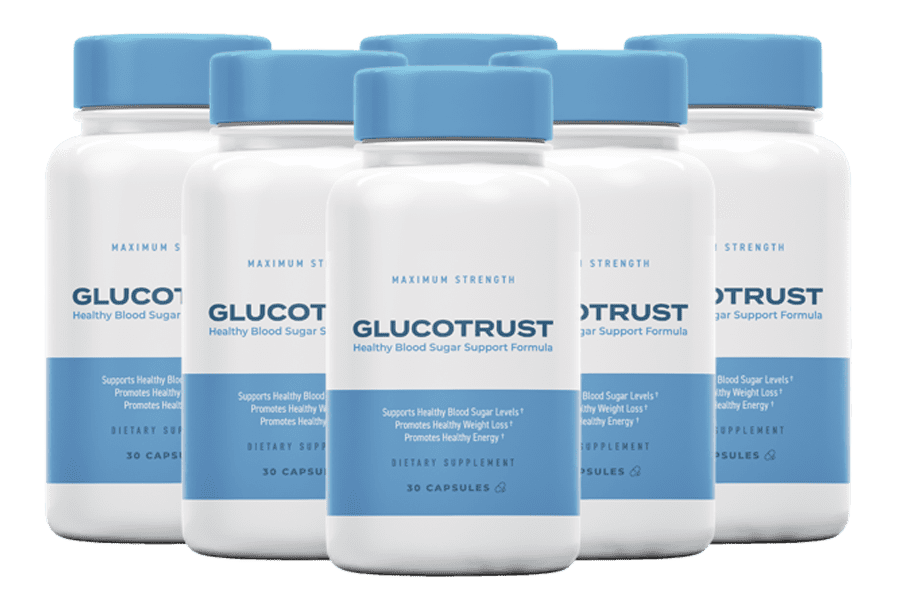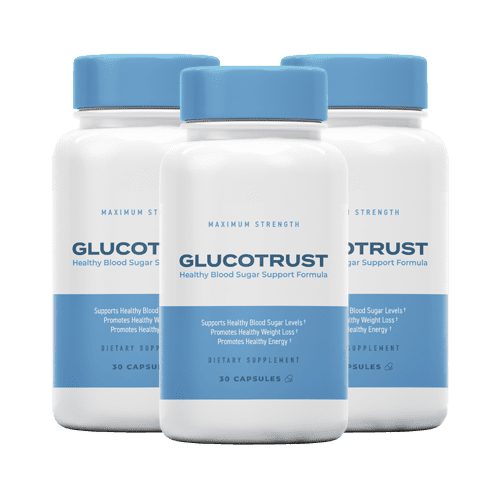Living with diabetes requires a proactive approach to managing blood sugar levels and maintaining overall health. While lifestyle modifications, such as a healthy diet and regular exercise, form the cornerstone of diabetes management, dietary supplements can also be crucial. One such supplement gaining attention in the diabetes community is Glucotrust.
Understanding the role of each ingredient is crucial in determining the effectiveness of any dietary supplement. Through extensive research and scientific evidence, Glucotrust has incorporated a synergistic combination of ingredients with unique properties and potential impact on diabetes management. By exploring these ingredients in detail, we aim to provide you with a comprehensive understanding of how Glucotrust can support your diabetes.
Throughout this guide, we will explore the origins, functions, and scientifically-backed benefits of each ingredient found in Glucotrust. Additionally, we will discuss any potential side effects or considerations to ensure you have all the information needed to make an informed decision about incorporating Glucotrust into your diabetes management routine.
Let us embark on this journey to unravel the power of Glucotrust’s ingredients and discover how they can enhance your diabetes management efforts. Whether you are newly diagnosed with diabetes or have been managing the condition for years, the insights provided in this guide will empower you to make informed choices about your health. Order today.
How GlucoTrust Ingredients Work to Improve Blood Sugar Control
It is important to note that GlucoTrust is not a miracle cure for diabetes. It is a dietary supplement that can help improve blood sugar control with a healthy diet and exercise. If you have diabetes, talking to your doctor before taking any dietary supplements is essential.
Gymnema Sylvestre is known for its unique ability to inhibit the taste of sweetness. Consumption temporarily blocks the taste receptors for sweet flavors, reducing the craving for sugary foods and beverages. This property makes it a valuable ingredient for individuals with diabetes who need to manage their sugar intake.
- Research-backed benefits of the ingredient in diabetes management: Numerous studies have explored the potential benefits of Gymnema Sylvestre in diabetes management.a. Blood Sugar Regulation: Gymnema Sylvestre has shown promise in helping to regulate blood sugar levels. It is believed to enhance insulin secretion from the pancreas, improving glucose utilization by the body’s cells. Reducing blood sugar spikes can contribute to better glycemic control.
b. Insulin Sensitization: Gymnema Sylvestre may help improve insulin sensitivity, allowing the body to utilize insulin more effectively. This can be particularly beneficial for individuals with type 2 diabetes, as it can assist in reducing insulin resistance and improving glucose uptake by the cells.
- Supporting studies and clinical trials showcasing its effectiveness: A study published in the Journal of Clinical Biochemistry and Nutrition found that Gymnema Sylvestre supplementation significantly reduced fasting blood sugar levels in individuals with type 2 diabetes.a. A clinical trial published in Diabetes, Obesity, and Metabolism reported that Gymnema Sylvestre supplementation improved glycemic control and reduced body weight in overweight individuals with type 2 diabetes.
- Side effects or considerations for usage: Gymnema Sylvestre is generally considered safe when used as directed. However, being aware of potential side effects and concerns is essential.
- Hypoglycemia Risk: Its ability to lower blood sugar levels may increase the risk of hypoglycemia (low blood sugar). Individuals taking medications for diabetes should monitor their blood sugar levels closely and consult with a healthcare professional to adjust their medication dosage if necessary.a. Allergic Reactions: While rare, some individuals may experience allergic reactions to Gymnema Sylvestre. If you have known allergies to plants or herbs, it is advisable to consult with a healthcare professional before using Glucotrust or any supplement containing this ingredient.
b. Interactions with Medications: Gymnema Sylvestre may interact with certain medications, such as oral hypoglycemic drugs or insulin. You must inform your healthcare provider about any supplements you are taking to avoid potential interactions.
Biotin: What is it, and why do you need it? Biotin is involved in several enzymatic reactions in the body that contribute to the metabolism of carbohydrates, fats, and proteins. It supports energy production from these macronutrients and helps maintain healthy skin, hair, and nails.
Some benefits of the ingredient in diabetes management: Biotin has been studied for its potential benefits in diabetes management. While more research is needed, some possible uses include:
- Blood Sugar Regulation: Biotin may help regulate blood sugar levels by enhancing enzyme activity in glucose metabolism. It is believed to improve insulin sensitivity and promote glucose uptake by cells, thus assisting in maintaining stable blood sugar levels.
- Lipid Metabolism: Studies suggest that biotin may contribute to healthy lipid metabolism, including the breakdown and utilization of fats. Promoting efficient fat metabolism may help manage lipid imbalances associated with diabetes.
- Peripheral Neuropathy Management: Peripheral neuropathy is a common complication of diabetes characterized by nerve damage. Research suggests that biotin supplementation may positively reduce neuropathic symptoms, such as pain, tingling, and numbness in the extremities.
Chromium is a trace mineral that is found in the earth’s crust. It is also found in small amounts in some foods, such as whole grains, fruits, vegetables, and meats. Chromium is an essential mineral for human health, and it plays a role in several bodily functions, including:
- Metabolism of carbohydrates, fats, and proteins
- Production of insulin
- Regulation of blood sugar levels
- Maintenance of muscle mass
- Bone health
- Fertility
Chromium is beneficial for people with diabetes in several ways. It can help to:
- Improve insulin sensitivity
- Lower blood sugar levels
- Reduce the risk of developing diabetes complications
In one study, people with type 2 diabetes who took chromium supplements for 12 weeks had significantly lower blood sugar levels than those who took a placebo. Another study found that chromium supplements can help to improve insulin sensitivity in people with prediabetes.
Possible side effects
Chromium is generally safe for most people to take. However, some people may experience side effects such as diarrhea, nausea, and vomiting. People should not take chromium supplements with kidney disease or pregnant or breastfeeding women.
Talking to your doctor first is essential if you are considering chromium supplements. They can help you to determine if chromium is suitable for you and can help you to choose a safe and effective supplement.
Here are some additional tips for taking chromium supplements:
- Take chromium supplements with meals.
- Do not take more than the recommended dose.
- Talk to your doctor before taking chromium supplements if you have any health conditions.
Manganese is necessary to function with several enzymes that metabolize glucose and lipids properly. It also produces the antioxidant enzyme superoxide dismutase (SOD), which helps protect cells from oxidative stress.
- Research-backed benefits of the ingredient in diabetes management: Manganese has been studied for its potential benefits in diabetes management. Although research is ongoing, some research-backed benefits include the following.a. Glucose Metabolism: Manganese metabolizes carbohydrates and regulates blood sugar levels. It plays a role in insulin secretion and action, improving glycemic control.b. Bone Health: Some studies suggest that manganese plays a role in bone health and may contribute to maintaining healthy bones. This is particularly relevant for individuals with diabetes, who may be at an increased risk of bone-related complications.
- Supporting studies and clinical trials showcasing its effectiveness: While further research is needed to establish a definitive link between manganese and diabetes management, here are some relevant findings:a. A study published in the Journal of Diabetes and its Complications investigated the association between manganese and glucose metabolism in individuals with type 2 diabetes. The study found that higher manganese levels were associated with improved glycemic control and insulin sensitivity.
- Any potential side effects or considerations for usage: Manganese is generally safe when consumed through dietary sources or inappropriate supplement forms. However, excessive intake of manganese through supplements can lead to adverse effects. Here are some considerations:a. Dosage and Toxicity: It’s essential to adhere to the recommended daily intake of manganese, as excessive intake can be toxic. High levels of manganese over an extended period may lead to neurological symptoms and impairments.b. Interactions with Medications: Manganese supplements may interact with certain medications, such as antibiotics and medicines for Parkinson’s disease. It’s advisable to consult with a healthcare professional before taking manganese supplements, especially if you are on any medications.
c. Individual Nutritional Needs: Manganese requirements vary among individuals, and supplementation should be based on individual needs and a healthcare professional’s guidance.
Licorice root has anti-inflammatory, antioxidant, and antimicrobial properties. It is known for its natural sweetness and is often used as a flavoring agent in confectionery and herbal preparations.
- Research-backed benefits of the ingredient in diabetes management: Licorice root has shown potential benefits in diabetes management through various mechanisms. Some research-backed benefits include:a. Blood Sugar Regulation: Licorice root has been found to have hypoglycemic effects, helping to regulate blood sugar levels. It may enhance glucose uptake by cells and promote insulin sensitivity, improving glycemic control.b. Antioxidant and Anti-inflammatory Effects: Licorice root contains flavonoids and other compounds with antioxidant and anti-inflammatory properties. These properties may help reduce oxidative stress and inflammation associated with diabetes, contributing to overall health and diabetes management.
c. Potential Anti-diabetic Effects: Studies suggest that licorice root may directly affect certain enzymes and receptors in glucose metabolism, insulin secretion, and insulin resistance. This may further support its role in diabetes management.
- Supporting studies and clinical trials showcasing its effectiveness: While more research is needed to establish the full extent of licorice root’s benefits in diabetes management, here are some notable findings from studies and clinical trials:a. A study published in the Journal of Ethnopharmacology investigated the effects of licorice root extract on blood sugar control in individuals with type 2 diabetes. The study found that licorice root extract improved glycemic control and reduced insulin resistance.
b. A clinical trial published in Phytotherapy Research examined the effects of licorice root extract on blood sugar levels and insulin sensitivity in healthy individuals. The results suggested that licorice root extract improved insulin sensitivity and positively impacted glucose metabolism.
- Side effects or considerations for usage: While licorice root can be beneficial, it’s essential to be aware of potential side effects and concerns, primarily when used in high doses or for extended periods. Here are some considerations:a. Hypertension and Fluid Retention: Licorice root contains compounds that can raise blood pressure and cause fluid retention. Individuals with hypertension or heart conditions should exercise caution and consult with a healthcare professional before using licorice root or licorice-containing supplements.
b. Interactions with Medications: Licorice root may interact with certain medications, such as diuretics, blood thinners, and remedies for high blood pressure. It would be best to inform your healthcare provider.
c. Glycyrrhizin Content: Licorice root contains glycyrrhizin, which can have hormonal effects. A prolonged high intake of glycyrrhizin can lead to mineral imbalances and hormonal disturbances.
Cinnamon is a spice derived from the inner bark of trees belonging to the Cinnamomum genus. It has been used for centuries in traditional medicine for its aromatic flavor and medicinal properties. Cinnamon is available in different forms, including ground cinnamon and cinnamon extract.
Cinnamon contains bioactive compounds, including cinnamaldehyde, cinnamic acid, and polyphenols, contributing to its unique properties. These compounds are responsible for cinnamon’s distinct flavor, fragrance, and potential health benefits.
- Research-backed benefits of the ingredient in diabetes management: Cinnamon has been studied extensively for its potential benefits in diabetes management. Some research-backed benefits include:a. Blood Sugar Regulation: Cinnamon may help regulate blood sugar levels by enhancing insulin sensitivity and glucose metabolism. It may also inhibit certain enzymes involved in carbohydrate digestion, reducing the rate at which glucose enters the bloodstream.
b. Insulin Sensitization: Studies suggest that cinnamon can enhance insulin sensitivity, allowing cells to respond more effectively to insulin. This can contribute to improved glucose uptake and utilization by the body’s cells
c. Antioxidant and Anti-inflammatory Effects: Cinnamon contains potent antioxidants and exhibits anti-inflammatory properties. These properties can help reduce oxidative stress, inflammation, and complications associated with diabetes.
- Supporting studies and clinical trials showcasing its effectiveness: Numerous studies have investigated the effects of cinnamon on diabetes management. Here are some notable findings:
a. A study published in Diabetes Care examined the effects of cinnamon supplementation on blood sugar control in individuals with type 2 diabetes. The study found that cinnamon significantly reduced fasting blood sugar levels and improved hemoglobin A1c levels (a marker of long-term glucose control).b. Another study published in the Journal of Medicinal Food investigated the impact of cinnamon supplementation on insulin sensitivity in individuals with prediabetes. The results showed improved insulin sensitivity and reductions in fasting glucose levels. - Cinnamon considerations for usage: Cinnamon is generally safe when consumed in moderate amounts as a spice or through supplementation. However, it’s essential to consider the following:a. Allergies: Some individuals may be allergic to cinnamon. If you have known allergies to spices or plants, it is advisable to consult with a healthcare professional before using cinnamon supplements.
b. Coumarin Content: Cassia cinnamon, a common type of cinnamon, contains a compound called coumarin. High intake of coumarin over a prolonged period may have potentially toxic effects on the liver. Opting for Ceylon cinnamon (true cinnamon) or consulting a healthcare professional for appropriate dosage and guidance is recommended.
c. Interactions with Medications: Cinnamon supplements may interact with certain medications, such as blood thinners and diabetes medications. If you take any medicines, informing your healthcare provider about your cinnamon supplementation is vital to avoid potential interactions.
Juniper berries: Do the juniper tree’s female seed cones belong to the Juniperus genus? They have a distinct flavor and are commonly used as a culinary spice and in producing certain beverages, such as gin. Juniper berries have also been used for potential health benefits in traditional medicine.
Juniper berries contain various bioactive compounds, including antioxidants, flavonoids, and essential oils. These compounds contribute to the natural properties of juniper berries and their potential effects on health.
- Research-backed benefits of the ingredient in diabetes management: Research on the specific benefits of juniper berries in diabetes management is limited. However, some potential benefits have been suggested:a. Antioxidant Effects: Juniper berries are rich in antioxidants, which can help reduce oxidative stress and inflammation. This may be beneficial in managing diabetes-related complications caused by oxidative damage.
b. Potential Blood Sugar Regulation: Some preliminary studies suggest that certain compounds found in juniper berries may have hypoglycemic effects and help regulate blood sugar levels. However, further research is needed to establish the extent of their impact on diabetes management.
c. Anti-inflammatory Properties: Inflammation plays a role in the development and progression of diabetes. The anti-inflammatory properties of juniper berries may help reduce inflammation in the body, supporting overall health and potentially aiding in diabetes management.
- Supporting studies and clinical trials showcasing its effectiveness: Limited clinical trials and studies have specifically investigated the effects of juniper berries on diabetes management. More research is needed to prove their effectiveness in this regard. However, juniper berries have been studied for other potential health benefits:a. A study published in Food and Chemical Toxicology explored the antioxidant and anti-inflammatory effects of juniper berries in rats. The findings suggested that juniper berry extract exhibited significant antioxidant and anti-inflammatory activities.
b. Another study published in the Journal of Ethnopharmacology investigated the potential anti-diabetic effects of a juniper berry extract in mice. The study reported improved insulin sensitivity and reduced blood sugar levels in the treated mice.
c. A review published in Food Science and Biotechnology discussed the various bioactive compounds in juniper berries and their potential health benefits. While the study highlighted antioxidant and anti-inflammatory properties, it emphasized the need for further research on their specific effects on diabetes management.
- Any potential side effects: It’s important to consider possible side effects and concerns when using juniper berries or juniper berry supplements:a. Allergic Reactions: Some individuals may be allergic to juniper berries. If you have known allergies to berries or plants, it is advisable to consult a physician.
b. Interactions with Medications: Juniper berries may interact with certain medications.
c. Gastrointestinal Effects: Excessive consumption of juniper berries may cause gastrointestinal discomfort, including upset stomach or diarrhea. It’s recommended to use juniper berries or juniper berry supplements in moderation
Glucotrust is a dietary supplement formulated with a blend of ingredients that show potential benefits in diabetes management. By understanding the role of each ingredient, individuals can make informed decisions about incorporating Glucotrust into their diabetes management routine.
The ingredients in Glucotrust, such as Gymnema Sylvestre, biotin, chromium, licorice root, and cinnamon, have been studied for their potential effects on blood sugar regulation, insulin sensitivity, antioxidant defense, and inflammation reduction. While research on some ingredients, like juniper berries, is limited, they may also contribute to overall health and diabetes management through their antioxidant properties.
These ingredients’ research-backed benefits include improved glycemic control, enhanced insulin sensitivity, regulation of blood sugar levels, and potential reductions in oxidative stress and inflammation. However, further research is needed to establish the full extent of their effectiveness in diabetes management.
Try My Healthy Meal Planner
Transform your meal planning with our Healthy Meal Planner GPT! This personalized tool helps you create balanced, organic meal plans tailored to your dietary needs and nutritional goals. Enjoy delicious recipe suggestions, easy grocery lists, and tips for efficient meal prep. Stay motivated and on track with our supportive, friendly guidance. Start your journey to a healthier you today!




